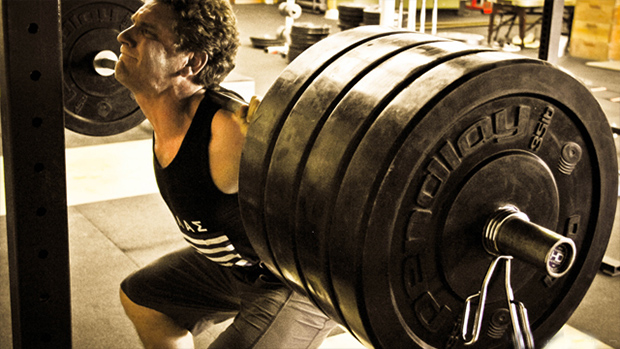You're going to the gym. You're lifting weights. Maybe you're even eating in a way to help you build muscle. The problem? Not much is happening now that the newbie gains have tapered off. Why? Probably for one of the reasons below.
If you're always looking for the next best thing, it'll halt your progress. It kills the most important factor when it comes to results: consistency.
Without consistency, your body has no clear idea of how to respond physiologically to your training. All it can do is fight to recover as you throw more and more conflicting training methods and diets at it.
Stick to one method long enough to achieve positive results. Then, if you're still getting results, don't switch things up until those results start to dwindle.
Do something long enough to know whether it has had a positive impact, then learn from it. It could take at least 3-4 weeks (sometimes longer) for your body to adapt to change.
If needed, hire a professional. The investment will make you more likely to be consistent.
You decide you want to get stronger, but you're also hell-bent on getting shredded. And then there's this triathlon you've got your eye on... Yes, this is an extreme example, but you get the point.
Which goal is your priority? If you conclude that they all are, some will need to be put on hold. If you can prioritize the most important and realistic of the bunch, the results will follow.
By breaking down goals into smaller chunks, some of the less realistic ones may need to be back-burnered. But there's good news: any progress you've made in one area can always be maintained when you shift your emphasis to another goal.
If you could complete your workout in under an hour, yet you spend almost two hours in the gym, figure out why.
The most likely scenario is spending too much time filming your sessions, talking to friends, or logging on to social media to watch someone else work harder than you.
Spreading your workout over a longer period of time could actually be screwing up your gains. Here are some ways to combat this:
Time Your Workouts
Inconsistent rest periods will lead to hitting inconsistent numbers in your training.
Wondering why you've suddenly hit two more reps on your last working set? It's unlikely that your body's adjusted and recovered that quickly, but it's very likely you've taken an extra 3-4 minutes of rest because you've been browsing your socials.
Putting a timeframe on your overall session can bring some consistency to your rest periods when you know you need to fit every planned exercise in before your gym time's up.
Stop Doing a Billion Exercises
You want to hit every muscle group at every angle possible to build a well-rounded physique, right? Wrong!
You'll get the majority of your progress from your first few exercises. So that extra 20-minute forearm circuit at the end of your pull session won't make a huge difference in the grand scheme.
Pick The Best Bang-For-Your-Buck Lifts
Sometimes less is more. The quality and intensity of your exercises arguably matter more than what they actually are. Pick the most effective exercises for the muscle group you're training and – with the correct intensity and the application of progressive overload – you'll increase these lifts over time.
If you're putting 3-4 extra movements into your workouts because you feel you aren't doing enough, it's likely overkill.

The more you do in the gym, the more energy you need to mobilize, which releases more cortisol. Cortisol amps us up, so naturally, we want to do more. One extra set leads to two, three, and before you know it, you've hit 12 sets of squats and 8 sets of lunges when your program called for 3 or 4.
Too much volume on a consistent basis can lead to excess cortisol and symptoms that feel a lot like overtraining. This is why exercise order is important for getting the most out of your workouts. Do the important things first and skip the unnecessary stuff.
Too much volume can make recovery hard primarily because of the inability to recover from CNS and muscular fatigue. If your muscles are worked by excessive volume, the damage to the fibers can become too severe to be able to train effectively in your next workout.
Continuing to push past this is what eventually leads to burning out and having days where you feel like the skinny marathoner can lift more than you.
Growth happens when you leave the gym. Impair recovery and you'll be a frustrated person. Frustration leads to burnout. Burnout makes you want to stop training.
Most of us have fallen victim to obsessive cardio. The problem? It's nearly impossible to burn off a bad diet. For many, excessive cardio only amplifies the appetite.
This can lead to things that actually take you further away from your fat loss efforts:
Soreness and Lethargy
This is dependent on how many miles you're racking up, but if daily chores seem like daunting tasks, you're doing too much. And it's likely keeping you from the iron.
Excessive Cortisol
Long bouts of cardio can chronically increase this stress hormone. Studies have shown that exercise (even low intensity) can deplete the glycogen stores in the body and release cortisol. Too much can cause tissue breakdown, reduced protein synthesis, and the conversion of protein to glucose.
A Weakened Immune System
The more stress you place on your body, the harder it is to recover. This includes cardiovascular work.
Poor Sleep
Just as overtraining can be bad for sleep, the same goes with too much cardio.
Loss of Motivation
This comes with overdoing anything fitness-related, but more so with cardio because not many of us enjoy it. If you abuse it, you'll be more likely to lose the motivation to train altogether.
If you're lifting regularly and eating well, you shouldn't need more than 20-30 minutes per cardio session. If you find yourself requiring more and more cardio to stay lean, your diet is the problem.
For competitors or those training for endurance events, this obviously changes. But for most of us, anything more than 30-45 minutes can be counterproductive, especially if your goal is building muscle.





